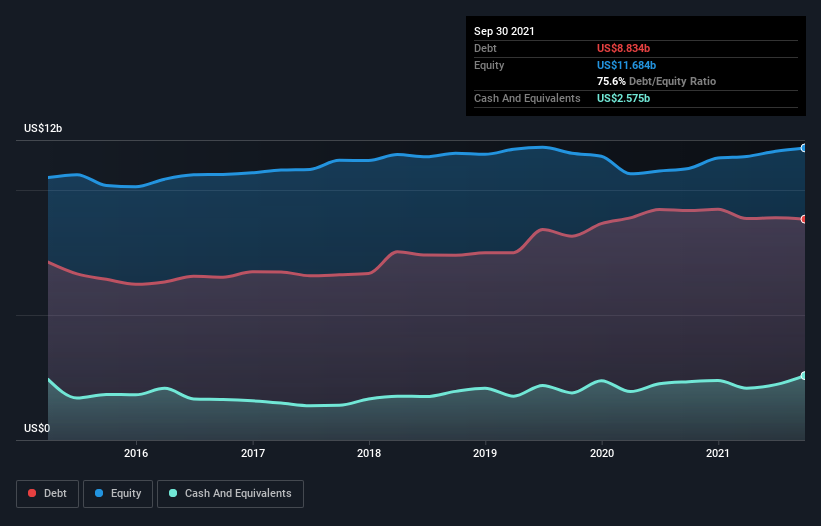
Warren Buffett famously said, 'Volatility is far from synonymous with risk.' So it seems the smart money knows that debt - which is usually involved in bankruptcies - is a very important factor, when you assess how risky a company is. As with many other companies AntarChile S.A. (SNSE:ANTARCHILE) makes use of debt. But is this debt a concern to shareholders?
When Is Debt A Problem?
Debt and other liabilities become risky for a business when it cannot easily fulfill those obligations, either with free cash flow or by raising capital at an attractive price. If things get really bad, the lenders can take control of the business. However, a more common (but still painful) scenario is that it has to raise new equity capital at a low price, thus permanently diluting shareholders. By replacing dilution, though, debt can be an extremely good tool for businesses that need capital to invest in growth at high rates of return. When we examine debt levels, we first consider both cash and debt levels, together.
See our latest analysis for AntarChile
What Is AntarChile's Net Debt?
The chart below, which you can click on for greater detail, shows that AntarChile had US$8.83b in debt in September 2021; about the same as the year before. On the flip side, it has US$2.58b in cash leading to net debt of about US$6.26b.

How Strong Is AntarChile's Balance Sheet?
According to the last reported balance sheet, AntarChile had liabilities of US$3.78b due within 12 months, and liabilities of US$10.9b due beyond 12 months. Offsetting these obligations, it had cash of US$2.58b as well as receivables valued at US$2.48b due within 12 months. So its liabilities outweigh the sum of its cash and (near-term) receivables by US$9.64b.
The deficiency here weighs heavily on the US$3.63b company itself, as if a child were struggling under the weight of an enormous back-pack full of books, his sports gear, and a trumpet. So we definitely think shareholders need to watch this one closely. At the end of the day, AntarChile would probably need a major re-capitalization if its creditors were to demand repayment.
We use two main ratios to inform us about debt levels relative to earnings. The first is net debt divided by earnings before interest, tax, depreciation, and amortization (EBITDA), while the second is how many times its earnings before interest and tax (EBIT) covers its interest expense (or its interest cover, for short). This way, we consider both the absolute quantum of the debt, as well as the interest rates paid on it.
AntarChile has net debt to EBITDA of 2.8 suggesting it uses a fair bit of leverage to boost returns. But the high interest coverage of 7.2 suggests it can easily service that debt. Pleasingly, AntarChile is growing its EBIT faster than former Australian PM Bob Hawke downs a yard glass, boasting a 193% gain in the last twelve months. The balance sheet is clearly the area to focus on when you are analysing debt. But it is future earnings, more than anything, that will determine AntarChile's ability to maintain a healthy balance sheet going forward. So if you're focused on the future you can check out this free report showing analyst profit forecasts.
Finally, a company can only pay off debt with cold hard cash, not accounting profits. So we clearly need to look at whether that EBIT is leading to corresponding free cash flow. Over the last three years, AntarChile reported free cash flow worth 11% of its EBIT, which is really quite low. For us, cash conversion that low sparks a little paranoia about is ability to extinguish debt.
Our View
We'd go so far as to say AntarChile's level of total liabilities was disappointing. But at least it's pretty decent at growing its EBIT; that's encouraging. Once we consider all the factors above, together, it seems to us that AntarChile's debt is making it a bit risky. That's not necessarily a bad thing, but we'd generally feel more comfortable with less leverage. There's no doubt that we learn most about debt from the balance sheet. But ultimately, every company can contain risks that exist outside of the balance sheet. Case in point: We've spotted 2 warning signs for AntarChile you should be aware of, and 1 of them is potentially serious.
At the end of the day, it's often better to focus on companies that are free from net debt. You can access our special list of such companies (all with a track record of profit growth). It's free.
New: Manage All Your Stock Portfolios in One Place
We've created the ultimate portfolio companion for stock investors, and it's free.
• Connect an unlimited number of Portfolios and see your total in one currency
• Be alerted to new Warning Signs or Risks via email or mobile
• Track the Fair Value of your stocks
Have feedback on this article? Concerned about the content? Get in touch with us directly. Alternatively, email editorial-team (at) simplywallst.com.
This article by Simply Wall St is general in nature. We provide commentary based on historical data and analyst forecasts only using an unbiased methodology and our articles are not intended to be financial advice. It does not constitute a recommendation to buy or sell any stock, and does not take account of your objectives, or your financial situation. We aim to bring you long-term focused analysis driven by fundamental data. Note that our analysis may not factor in the latest price-sensitive company announcements or qualitative material. Simply Wall St has no position in any stocks mentioned.
About SNSE:ANTARCHILE
AntarChile
Invests in forestry, food and fishing, fuel distribution, energy, mining, and other sectors in South America and internationally.
Solid track record, good value and pays a dividend.
Market Insights
Community Narratives



